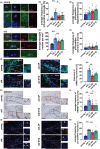Whole-body senescent cell clearance alleviates age-related brain inflammation and cognitive impairment in mice
- PMID: 33470505
- PMCID: PMC7884042
- DOI: 10.1111/acel.13296
Whole-body senescent cell clearance alleviates age-related brain inflammation and cognitive impairment in mice
Abstract
Cellular senescence is characterized by an irreversible cell cycle arrest and a pro-inflammatory senescence-associated secretory phenotype (SASP), which is a major contributor to aging and age-related diseases. Clearance of senescent cells has been shown to improve brain function in mouse models of neurodegenerative diseases. However, it is still unknown whether senescent cell clearance alleviates cognitive dysfunction during the aging process. To investigate this, we first conducted single-nuclei and single-cell RNA-seq in the hippocampus from young and aged mice. We observed an age-dependent increase in p16Ink4a senescent cells, which was more pronounced in microglia and oligodendrocyte progenitor cells and characterized by a SASP. We then aged INK-ATTAC mice, in which p16Ink4a -positive senescent cells can be genetically eliminated upon treatment with the drug AP20187 and treated them either with AP20187 or with the senolytic cocktail Dasatinib and Quercetin. We observed that both strategies resulted in a decrease in p16Ink4a exclusively in the microglial population, resulting in reduced microglial activation and reduced expression of SASP factors. Importantly, both approaches significantly improved cognitive function in aged mice. Our data provide proof-of-concept for senolytic interventions' being a potential therapeutic avenue for alleviating age-associated cognitive impairment.
Keywords: SASP; aging; brain; cognition; memory; neurodegeneration; senescence; senolytic; telomeres.
© 2021 The Authors. Aging Cell published by the Anatomical Society and John Wiley & Sons Ltd.
Conflict of interest statement
Patents on
Figures




References
-
- Acosta, J. C. , Banito, A. , Wuestefeld, T. , Georgilis, A. , Janich, P. , Morton, J. P. , Athineos, D. , Kang, T.‐W. , Lasitschka, F. , Andrulis, M. , Pascual, G. , Morris, K. J. , Khan, S. , Jin, H. , Dharmalingam, G. , Snijders, A. P. , Carroll, T. , Capper, D. , Pritchard, C. , … Gil, J. (2013). A complex secretory program orchestrated by the inflammasome controls paracrine senescence. Nature Cell Biology, 15, 978–990. 10.1038/ncb2784 - DOI - PMC - PubMed
-
- Aguayo‐Mazzucato, C. , Andle, J. , Lee, Jr., T. B. , Midha, A. , Talemal, L. , Chipashvili, V. , Hollister‐Lock, J. , Van Deursen, J. , Weir, G. , & Bonner‐Weir, S. (2019). Acceleration of beta cell aging determines diabetes and senolysis improves disease outcomes. Cell Metabolism, 30, 129–142e124. 10.1016/j.cmet.2019.05.006 - DOI - PMC - PubMed
-
- Baker, D. J. , Childs, B. G. , Durik, M. , Wijers, M. E. , Sieben, C. J. , Zhong, J. , A. Saltness, R. , Jeganathan, K. B. , Verzosa, G. C. , Pezeshki, A. , Khazaie, K. , Miller, J. D. , & van Deursen, J. M. (2016). Naturally occurring p16Ink4a‐positive cells shorten healthy lifespan. Nature, 530, 184–189. 10.1038/nature16932 - DOI - PMC - PubMed
Publication types
MeSH terms
Substances
Grants and funding
- AG050582-01A1/AG/NIA NIH HHS/United States
- AG013925/AG/NIA NIH HHS/United States
- BB/H022384/1/BB_/Biotechnology and Biological Sciences Research Council/United Kingdom
- AG056053/NH/NIH HHS/United States
- BB/K017314/1/BB_/Biotechnology and Biological Sciences Research Council/United Kingdom
- U24 AG056053/AG/NIA NIH HHS/United States
- P30 AG050886/AG/NIA NIH HHS/United States
- R01 AG068182/AG/NIA NIH HHS/United States
- MR/P020941/1/MRC_/Medical Research Council/United Kingdom
- UL1 TR002377/TR/NCATS NIH HHS/United States
- P20 GM109035/GM/NIGMS NIH HHS/United States
- R37 AG013925/AG/NIA NIH HHS/United States
- R01 AG069048/AG/NIA NIH HHS/United States
- P01 AG062413/AG/NIA NIH HHS/United States
- AG050886/NH/NIH HHS/United States
- T32 AG041688/AG/NIA NIH HHS/United States
- BB/S006710/1/BB_/Biotechnology and Biological Sciences Research Council/United Kingdom
- UL1 TR0002377/TR/NCATS NIH HHS/United States
- R01 AG050582/AG/NIA NIH HHS/United States
- R56 AG050582/AG/NIA NIH HHS/United States
LinkOut - more resources
Full Text Sources
Other Literature Sources
Medical
Molecular Biology Databases

